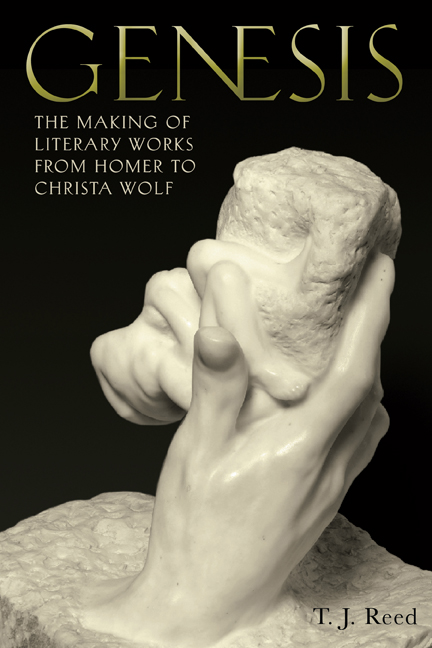Book contents
- Frontmatter
- Dedication
- Contents
- Note on Quotations and Translations
- Preface
- Introduction: Processes
- Part I Antiquity
- 1 Homer's Audiences: Shaping the Iliad (and the Odyssey)
- 2 Fourfold Genesis: The Bible between Literature and Authority
- Part II Early Modern
- 3 An Alphabet of Experience: Montaigne
- 4 Beginner's Luck: Shakespeare's History Cycles
- Transition—Tradition
- Part III Goethe
- 5 Cross-Purposes: Goethe's Faust
- 6 Occasions: Goethe's Lyric Poetry
- 7 Live and Learn: Werther and Wilhelm Meister
- Part IV Nineteenth- and Twentieth-Century German
- 8 Writing on the Run: Georg Büchner's Revolutions
- 9 “The Best-Laid Schemes…”: Thomas Mann Unplanned
- 10 Description of a Struggle: Kafka's Half-Escape
- 11 Atomic Beginnings: Brecht, Galileo, and After
- 12 Knowing and Partly Knowing: Paul Celan's Mission
- 13 Christa Wolf: A Fall from Grace
- Afterword
- Notes
- Bibliography
- Index
- Frontmatter
- Dedication
- Contents
- Note on Quotations and Translations
- Preface
- Introduction: Processes
- Part I Antiquity
- 1 Homer's Audiences: Shaping the Iliad (and the Odyssey)
- 2 Fourfold Genesis: The Bible between Literature and Authority
- Part II Early Modern
- 3 An Alphabet of Experience: Montaigne
- 4 Beginner's Luck: Shakespeare's History Cycles
- Transition—Tradition
- Part III Goethe
- 5 Cross-Purposes: Goethe's Faust
- 6 Occasions: Goethe's Lyric Poetry
- 7 Live and Learn: Werther and Wilhelm Meister
- Part IV Nineteenth- and Twentieth-Century German
- 8 Writing on the Run: Georg Büchner's Revolutions
- 9 “The Best-Laid Schemes…”: Thomas Mann Unplanned
- 10 Description of a Struggle: Kafka's Half-Escape
- 11 Atomic Beginnings: Brecht, Galileo, and After
- 12 Knowing and Partly Knowing: Paul Celan's Mission
- 13 Christa Wolf: A Fall from Grace
- Afterword
- Notes
- Bibliography
- Index
Summary
There is less of a gap than might appear between the two main sections of this book, the wider European and the specifically German. The introductory chapters, besides being large-scale examples of genetic process, are linked in substance with what follows, indeed are in large measure its precondition. Homer, the Bible, and Shakespeare were live forces in the minds of modern European writers, in German no less than in the other vernacular languages. Montaigne too, with his innovative, rich picture of a single private world, surely emboldened later explorers of human character and experience.
From the rediscovery of Antiquity in the Renaissance and onward, Homer was its central literary symbol. Homeric epic was a source of mythical figures and actions and of the very conception of narrative, recognizable even as it mutated in the eighteenth century into the new phenomenon of the novel, which for Hegel was “the modern bourgeois epic” capturing a new prosaic reality—increased psychological and social complexity in place of violent action and tribal custom. The Bible, for its part, was a treasury of story and myth alternative to the classical heritage and, in its Protestant translations into English and German, a shaping influence on the literary language of those cultures. Bertolt Brecht of all people, the enfant terrible of the 1920s, when asked about the sources of his style, said “You’ll laugh: the Bible.” Serious- to-solemn German literary occasions fell instinctively into Luther's syntax and rhythms, as English ones did into the structures and rhythms of the Authorized Version; their presences are subliminally felt, and no less powerful for that. Shakespeare reigned over literature at large as an object of reverence and a challenge to creative emulation. Goethe's revolutionary first drama Götz von Berlichingen took over Shakespeare's formal freedoms and an immunity to the constricting classical “unities.” Büchner's and Brecht's plays moved in the same broad stream. Poets down to Paul Celan tempered their style on translations of Shakespeare's sonnets. “Shakespeare without end,” the motto Goethe set over his working life, helped to shape the German national literature of the later eighteenth and the nineteenth century. Shakespeare’s plays became virtually part of it, in repeated waves of translation, especially the masterly interpretative versions of August Wilhelm Schlegel and Ludwig Tieck.
- Type
- Chapter
- Information
- GenesisThe Making of Literary Works from Homer to Christa Wolf, pp. 100Publisher: Boydell & BrewerPrint publication year: 2020



